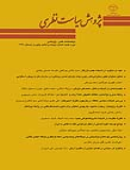روانشناسی تودهها و بازاندیشی در دیدگاههای پساسیاسی: ابعاد فرانظری دیدگاه «الیاس کانتّی»
محورهای موضوعی : پژوهش سیاست نظریعلياشرف نظري 1 , نگین نوریان دهکردی 2 *
1 - دانشیار گروه علوم سیاسی، دانشگاه تهران
2 - دانشجوی دکتری علوم سیاسی
کلید واژه: روانشناسی توده ای رفتار گروهی کنش عقلانی شور الیاس کانتّی,
چکیده مقاله :
قرن بیست ویکم، خیزش امواج توده ای را در شکل های گوناگون به چشم دیده و شاهد رفتارهای گروهی ویرانگر بوده است که با سیمای انسان در قامت کنشگر عقلانی در تناقضی آشکار قرار دارد. انسانی که انتظار می رفت از تجربه های سهمگین توده ای در قرن بیستم درس آموخته باشد، امروز چنان در نقش موجودی غیر عقلانی و فردیت زدایی شده ظاهر می شود که ما را به بازنگری در تأثیر گروه بر فرد و قدرت سهمگین جماعت و توده بر رفتار آدمی فرامی خواند. روان شناسی توده ای در بررسی رفتارهای مخرب انسان در گروه، بر اهمیت شور و احساسات تأکید می کند و در تلاش است تا به شناخت ماهیت توده ها و جماعت های انسانی و مکانیزم های مهار و کنترل قدرت آنها بپردازد. هدف این نوشتار آن است که با استفاده از دیدگاه های «الیاس کانتّی»، به مثابۀ تماشاگر ژرف بین روزگار فاشیسم، نازیسم و استالینیسم، بر خیزش توده ها در قرن حاضر پرتو بیفکند. پرسش اصلی آن است که دیدگاه های کانتی درباره قدرت توده ها در زمانۀ ما چه برای گفتن دارد؟ در پاسخ به این پرسش، با تحلیل محتوای کیفی مهم ترین آثار او در این باره نشان خواهیم داد که دیدگاه های کانتّی میتواند برای مواجهه با پدیده های توده ای، شناخت ماهیت توده ها و تحلیل قدرت و پویایی آنها و نیز شناخت مکانیزم های مهار قدرت توده و جریان های توده ای در قرن بیست ویکم به کار گرفته شود. با نگریستن از منظر روان شناسی توده ای کانتّی درمی یابیم که چگونه با فرسایش سازوکار های مهار توده ها، نه تنها امکان فوران جریان های توده ای از جهان ما رخت برنبسته است، بلکه قدرت توده ها به شکل تهدیدآمیزی، مهارناپذیرتر و افسارگسیخته تر از پیش رخ نشان می دهد.
The 21st century has seen the rise of crowd waves in various forms and witnessed destructive group behaviors, which are manifestly in contradiction with the image of human as a rational actor. The human was thought to learn from the terrible experiences of the masses of the twentieth century, today appears as such an irrational de-individualized character that inspired us to rethink the effect of the group on the individual and the tremendous power of the crowd over human behavior. Crowd psychology emphasizes on the importance of passion and emotion in the study of human destructive behaviors in the group and seeks to identify the nature of human crowds and masses and the mechanisms of control of their power. The purpose of this essay is to use the views of Elias Canetti, as a profound observer of Fascism, Nazism and Stalinism, in order to cast light on the rise of crowds in the present century. The main question is what do Canetti perspectives say about the power of the crowds in our time? We will, in response to this question, by qualitative content analysis of part of his works, show that Canetti views can be utilized to deal with crowd phenomena. In addition, for understanding the nature of the masses and crowds and to analyze their power and dynamics and to recognize the mechanisms of control of crowd power and mass uprisings in the 21st century. From the perspective of Canetti crowd psychology, we find that with the erosion of the mechanisms of containment of the crowd power, the danger of mass eruption not only has not banished from our world, but crowd power can appear more threatening and uncontrollable than before.
بک، اولریش (1388) جامعۀ در مخاطرۀ جهانی، ترجمۀ محمدرضا مهدی¬زاد، تهران، کویر.
رابوئن، دیوید (1384) «مرزهای یک جنون»، سمرقند، شمارۀ 11و 12، پاییز و زمستان، صص 4-9.
رایشمان، ادگار (1375) «زیر آفتاب تیرۀ نژادپرستی، الیاس کانتّی؛ گفت¬وگویی خیالی»، ترجمۀ مصطفی اسلامیه، پیام یونسک ، شمارۀ 310، اردیبهشت، صص 26-29.
ریفکین، جرمی (1386) «مخاطرات افزایش تعداد شهرهای بزرگ»، سیاحت غرب، شمارۀ 50، شهریور، صص 1-2.
دسترسی در: http://pajuhesh.
irc.
ir/Product/magazine/show.
text/id/1208/book_keyword//occasion//index/1/indexId/15336#book-footnottext-1 کانتّی، الیاس (1388) توده و قدرت، ترجمۀ هادی مرتضوی، تهران، قطره.
---------- (1392) شاهد گوشی؛ پنجاه شخصیت، ترجمۀ علی عبداللهی، تهران، مرکز.
و یوسف حاجی عبدالوهاب، تهران، علم و ادب.
گیدنز، آنتونی (1382) فراسوی چپ و راست، ترجمۀ محسن ثلاثی، تهران، علمی.
لوبون، گوستاو (1369) روان¬شناسی توده¬ها، ترجمۀ کیومرث خواجوی¬ها، تهران، روشنگران.
موف، شانتال (1390) دربارۀ امر سیاسی، ترجمۀ منصور انصاری، تهران، رخ¬داد نو.
نظری، علی¬اشرف (1396) «چرخش مفهوم سیاست و بازآفرینی امر سیاسی، درک زمینه¬های هستیشناختی»، فصلنامۀ سیاست، مجلۀ دانشکدۀ حقوق و علوم سیاسی، دورۀ 47، شمارۀ 1، بهار، صص 257-277.
هلد، دیوید و آنتونی مک¬گرو (1395) جهانی ¬شدن و مخالفان آن، ترجمۀ عرفان ثابتی، تهران، ققنوس.
Arnason, Johann P, David Roberts (2004) Elias Canetti's Counter-Image of Society, Crowds, Power, Transformation, Published by Boydell & Brewer.
Beswick, Emma (2018) Women's March 2018, 11 of the best signs, chosen by Euronews, in, http,//www.euronews.com/2018/01/21/women-s-march-2018-11-of-the-best-signs-chosen-by-euronews.
Boffey, Daniel (12 Jun 2016) Euro 2016, England and Russia fans clash before and after match in Marseille, in, https,//www.theguardian.com/football/2016/jun/11/euro-2016-french-police-tactics-raise-fears-of-more-clashes-with-england-fans.
Canetti, Elias (1978) Crowds and Power, Translated by Carol Stewart, New York, Continuum,https,//www.huffingtonpost.com/st-gallen-symposium/the-rise-of-cities-in-the_b_7720860.html.
McLaughlin, Eliott C, (May 2, 2017) May Day rallies turn violent, in, https,//edition.cnn.com/2017/05/01/world/may-day-celebrations-protests-around-world/index.html.
Newland, Kathleen, (October 2016) New Approaches to Refugee Crises in the 21st Century, The Role of the International Community, in, https,//www.migrationpolicy.org/research/new-approaches-refugee-crises-21st-century-role-international-community.
Postmes, T., & Spears, R (1998) De-individuation and anti-normative behaviour, A meta-analysis, Psychological Bulletin, 123, 238-259.
Sanchez, Ray (September 16, 2016) Occupy Wall Street, 5 years later, in, https,//edition.cnn.com/2016/09/16/us/occupy-wall-street-protest-movements/index.html.
Vilanova, Felipe [and others] (2017) Deindividuation, From Le Bon to the social identity model of deindividuation effects, Cogent Psychology, Volume 4, Issue 1, in, https,//www.cogentoa.com/article/10.1080/23311908.2017. 1308104.pdf.

